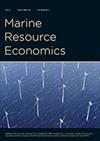Fisheries Management under Uncertainty Using a Convex Tax
IF 1.7
3区 经济学
Q2 ECONOMICS
引用次数: 0
Abstract
This article considers the use of convex taxation as an instrument to regulate fisheries, comparing it with linear taxation with regards to economic yields and the risk of resource depletion. Convex taxation is shown to be central in studies with static models but has rarely been explored in the context of dynamic fisheries. Literature shows that a linear tax regime is superior to quantity regulation when the stock estimate is uncertain in terms of economic gains and its ability to prevent resource extinction. Furthermore, when cost uncertainty is involved, a strictly convex tax on landings can prove even more efficient. A numerical example with a single-species demersal fishery having both ecological and economic uncertainty demonstrates the gain in value of moving from a linear to a strictly convex tax.不确定性下使用凸税的渔业管理
本文考虑使用凸税收作为调节渔业的工具,将其与线性税收在经济产量和资源枯竭风险方面进行比较。凸征税在静态模型的研究中显示为中心,但很少在动态渔业的背景下进行探索。文献表明,当存量估计在经济收益和防止资源灭绝的能力方面不确定时,线性税收制度优于数量管制。此外,当涉及成本不确定性时,对着陆征收严格的凸税可能会更有效。一个具有生态和经济不确定性的单一物种底栖渔业的数值例子证明了从线性税到严格凸税的价值增加。
本文章由计算机程序翻译,如有差异,请以英文原文为准。
求助全文
约1分钟内获得全文
求助全文
来源期刊

Marine Resource Economics
农林科学-渔业
CiteScore
4.30
自引率
10.30%
发文量
25
审稿时长
>12 weeks
期刊介绍:
Marine Resource Economics (MRE) publishes creative and scholarly economic analyses of a range of issues related to natural resource use in the global marine environment. The scope of the journal includes conceptual and empirical investigations aimed at addressing real-world oceans and coastal policy problems. Examples include studies of fisheries, aquaculture, seafood marketing and trade, marine biodiversity, marine and coastal recreation, marine pollution, offshore oil and gas, seabed mining, renewable ocean energy sources, marine transportation, coastal land use and climate adaptation, and management of estuaries and watersheds.
 求助内容:
求助内容: 应助结果提醒方式:
应助结果提醒方式:


